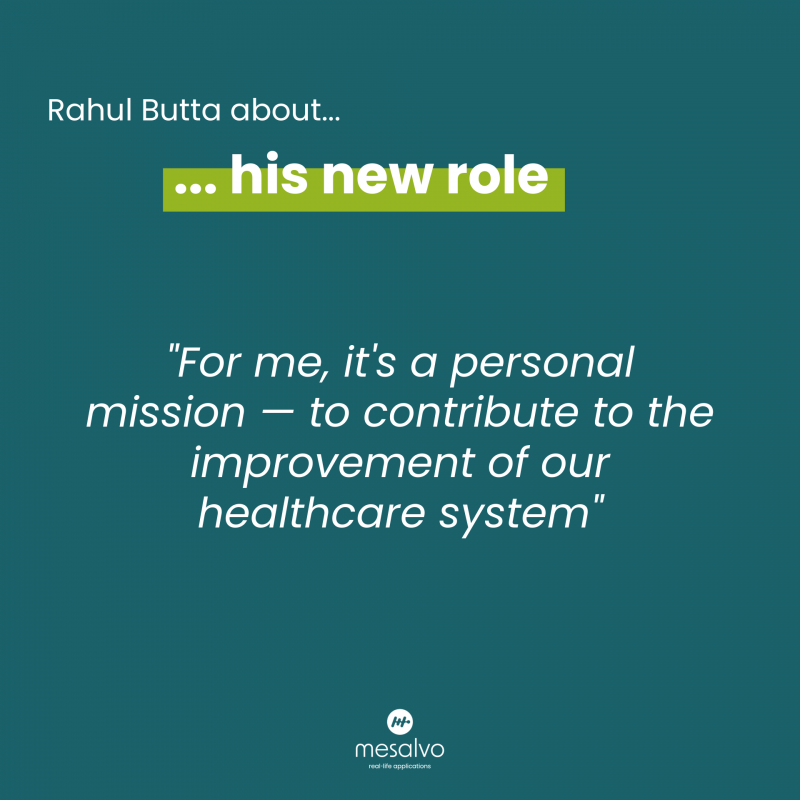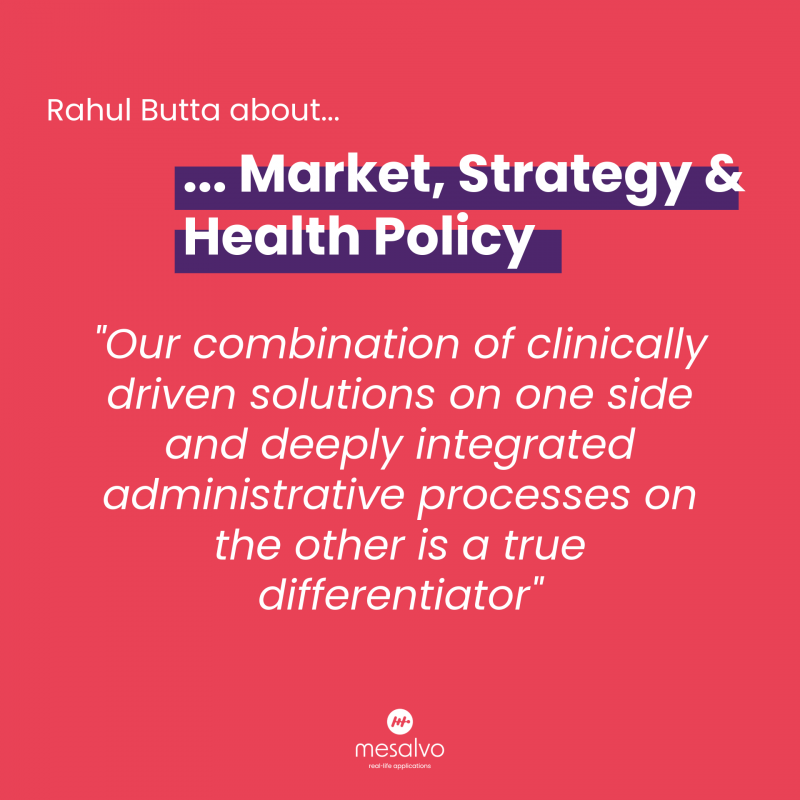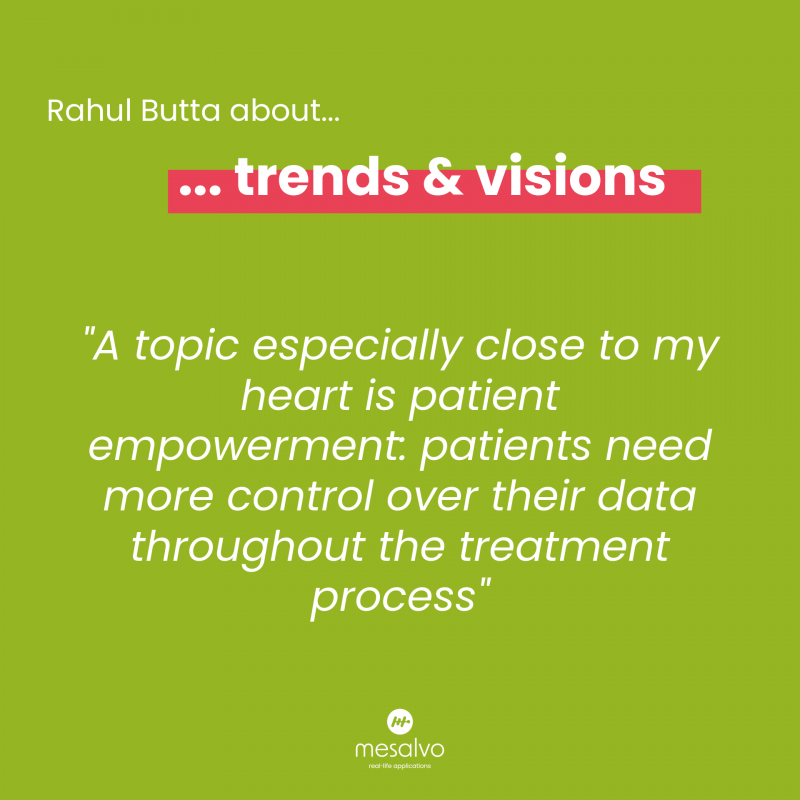The digital transformation of healthcare is in full swing — with great opportunities but also significant challenges. That’s why a clear product strategy that unites technological excellence, market knowledge, and user orientation is more important than ever.
With Rahul Butta joining as Director of Product Management, Mesalvo welcomes a seasoned expert who brings together technology and user needs with strategic clarity. In this interview, he shares his motivation for shaping digital healthcare, current developments in the health IT market, and what excellence in product strategy really looks like.
About the Person – Who's Behind the Role?
Welcome to Mesalvo, Rahul. What led you to work in digital healthcare?
I originally studied medicine and wanted to become a psychiatrist. But even during my studies, I realized the potential of IT in healthcare — especially when I had to fetch patient records manually from the basement while other industries were already working digitally. That’s when I switched to studying “Information Management in Medicine,” and I’ve now been working in healthcare IT for over 15 years. Through my PhD and various professional roles — including at Cerner — I eventually found my way into product development.
What particularly attracted you to the role at Mesalvo?
Clearly, the broad and interdisciplinary product portfolio. It touches both administrative and clinical processes — and I see huge potential to further develop and strategically integrate them as a whole.
Which professional experiences have best prepared you for your current role?
On one hand, my clinical experience as a physician — which gives me a strong understanding of end-user perspectives. On the other hand, my product responsibilities in areas such as medication and DRG, my work in internationalization and business development, and my leadership experience.
What motivates you personally to work in healthcare IT?
For me, it's a personal mission — to contribute to the improvement of our healthcare system.

How would you describe your leadership style?
I believe in collaboration. The best solutions are developed together — within teams, across departments, and with customers. I encourage initiative and value expertise, regardless of hierarchy.
Market, Strategy & Health Policy – An Expert’s Perspective

What are currently the biggest challenges in healthcare IT?
Interoperability remains a central challenge — and it's growing. It's no longer just about exchanging data, but enabling seamless, cross-sector processes. Add to that a fragmented IT landscape, a significant need for information on new technologies like cloud solutions, and a shortage of professionals — both on the clinical and IT sides.
How do you view current healthcare policy initiatives in Germany — such as the Digital Act or TI 2.0?
The political goals are ambitious and generally welcome — especially the further development of the TI and the electronic patient record (ePA). However, implementation remains a major hurdle. Many legal, technical, and organizational questions are still unresolved, which negatively impacts acceptance and usage. We need more clarity, less complexity, and more courage to change. Good examples like Estonia show what’s possible when regulatory frameworks are well-designed. Estonia leads the Digital Health Index by a wide margin compared to all other European countries. E-prescriptions, electronic patient records, and a central health portal are already a fixed part of daily life there. The foundation is a national digital infrastructure that integrates all health services and provides citizens with secure, central access to their health data — anytime and anywhere.
What are your strategic goals at Mesalvo?
I want to make our solutions future-ready — not just reacting to current demands, but proactively developing strategies that provide real perspective for our customers. A good example is Mesalvo’s HealthCentre portfolio strategy: individual solutions are being brought together into a holistic portfolio and migrated to a unified technology and cloud platform, HealthCentre Cortex.
How is Mesalvo positioned in the competitive landscape?
Our combination of clinically driven solutions on one side and deeply integrated administrative processes on the other is a true differentiator. Bringing both worlds together — on one platform — is a clear competitive advantage.
What role does interoperability play — and where does Germany currently stand?
Interoperability is the key to digital transformation. Germany still has room to improve — partly due to its complex federal system. But initiatives like the new ePA 2.0 or the increasing adoption of FHIR standards are promising. The mandatory use of KIM services now enables standardized communication between outpatient and inpatient facilities nationwide. The KBV’s Medical Information Objects (MIOs) are another important step for semantically consistent documentation — for example, in preventive check-ups or medication plans. Such initiatives lay the necessary groundwork for connected care — now it’s about implementing them consistently.
How is the relationship between providers, payers, and technology vendors evolving?
It’s becoming more cooperative — and that’s essential. Digital solutions require shared standards and strategic alignment. Technology providers are becoming key partners who bring innovation and make it workable. And not least: the patient will play an increasingly active role.
Trends & Visions – A Look Ahead
Which healthcare IT trends do you find particularly relevant right now?
Artificial intelligence — in both diagnostics and process optimization. Telemedicine and cross-sector platforms, such as those that enable virtual visits and remote monitoring, are also gaining traction. A topic especially close to my heart is patient empowerment: patients need more control over their data throughout the treatment process — not just through the ePA, but also with intuitive hospital portals. Personally, I’ve seen how analog some processes still are — that needs to change. Patients shouldn’t have to carry around piles of paperwork or endure long wait times.
Another important area is the capture and use of structured data for better treatment decisions, patient care, quality assurance, AI integration, and advancing research.
This requires a technological foundation that makes data available in a structured and usable way. Our cloud-based platform, HealthCentre | Cortex, hosted on Amazon Web Services (AWS), offers the security, flexibility, and high availability needed. A central element is the Clinical Data Repository (CDR), which enables real-time access to health data — essential for modern applications, decision support, and interoperability.
What impact does AI already have — and what do you expect in the future?
AI is already being used — for example, in medical imaging or documentation. I expect it will become even more deeply embedded in clinical workflows — especially in decision support and process automation. Solutions like those from Omilon show the direction: Omilon provides speech-to-text systems that integrate seamlessly into hospital systems and reduce the time needed to generate structured clinical documentation. But it's also essential to keep ethical and regulatory issues in mind — such as bias in AI systems.

How do you deal with the tension between innovation and regulation?
It’s a balancing act — but a necessary one. Regulation strengthens patient safety and builds trust. At the same time, we need space for innovation without excessive bureaucracy slowing things down.
What do you wish for the future of digital healthcare in Germany?
Above all: stronger involvement of patients. And of course, more consistent implementation of political measures and a regulatory environment that fosters innovation. Just look at the data protection debate around AI applications — it shows how difficult it is to even set up a pilot project. I also hope for more investment in training IT professionals in healthcare.
Finally: What would you like to share with our customers and partners?
I’m excited about the journey ahead — and about tackling challenges together, as partners. With a positive outlook and a clear goal: to actively shape the future of digital healthcare.
Thank you for the conversation and your valuable insights! We look forward to advancing digital healthcare with you — with strategic foresight, innovation, and a strong commitment to our vision: "Empower Excellence in Health and Care."
Because only with well-designed, high-quality solutions can we create real value — for providers, payers, and above all: for patients.




